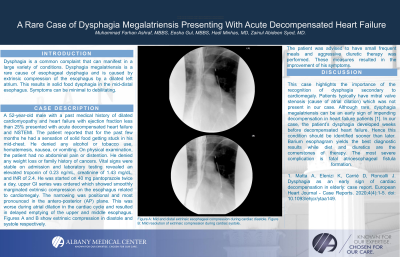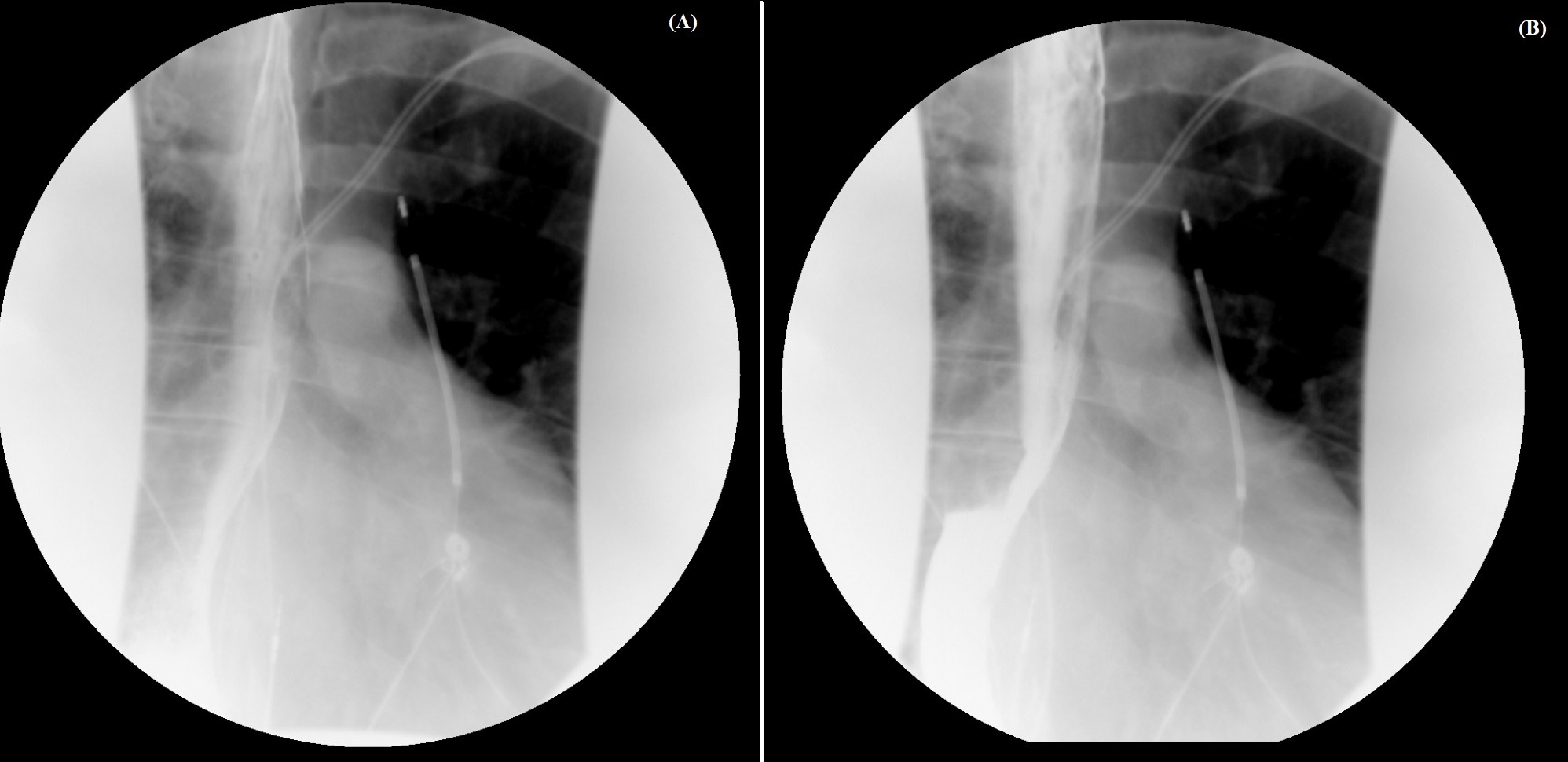Back


Poster Session A - Sunday Afternoon
Category: Esophagus
A0208 - A Rare Case of Dysphagia Megalatriensis Presenting With Acute Decompensated Heart Failure
Sunday, October 23, 2022
5:00 PM – 7:00 PM ET
Location: Crown Ballroom

Has Audio

Muhammad Farhan Ashraf, MBBS
Albany Medical Center
Albany, New York
Presenting Author(s)
Muhammad Farhan Ashraf, MBBS1, Eesha Gul, MBBS2, Hadi Minhas, MD1, Zainul Abideen Syed, MD1
1Albany Medical Center, Albany, NY; 2King Edward Medical University, Albany, NY
Introduction: Dysphagia is a common complaint that can manifest in a large variety of conditions. Dysphagia megalatriensis is a rare cause of esophageal dysphagia and is caused by extrinsic compression of the esophagus by a dilated left atrium. This results in solid food dysphagia in the mid-distal esophagus. Symptoms can be minimal to debilitating.
Case Description/Methods: A 52-year-old male with a past medical history of dilated cardiomyopathy and heart failure with ejection fraction less than 25% presented with acute decompensated heart failure and NSTEMI. The patient reported that for the past few months he had a sensation of solid food getting stuck in his mid-chest. He denied any alcohol or tobacco use, hematemesis, nausea, or vomiting. On physical examination, the patient had no abdominal pain or distention. He denied any weight loss or family history of cancers. Vital signs were stable on admission and laboratory testing revealed an elevated troponin of 0.23 ng/mL, creatinine of 1.43 mg/dL, and INR of 2.4. He was started on 40 mg pantoprazole twice a day, upper GI series was ordered which showed smoothly marginated extrinsic compression on the esophagus related to cardiomegaly. The narrowing was positional and most pronounced in the antero-posterior (AP) plane. This was worse during atrial dilation in the cardiac cycle and resulted in delayed emptying of the upper and middle esophagus. Figures A and B show extrinsic compression in diastole and systole respectively. The patient was advised to have small frequent meals and aggressive diuretic therapy was performed. These measures resulted in the improvement of his symptoms.
Discussion: This case highlights the importance of the recognition of dysphagia secondary to cardiomegaly. Patients typically have mitral valve stenosis (cause of atrial dilation) which was not present in our case. Although rare, dysphagia megalatriensis can be an early sign of impending decompensation in heart failure patients [1]. In our case, the patient’s dysphagia developed weeks before decompensated heart failure. Hence this condition should be identified sooner than later. Barium esophagram yields the best diagnostic results while diet and diuretics are the cornerstones of therapy. The most severe complication is fatal atrioesophageal fistula formation.
1. Matta A, Elenizi K, Carrié D, Roncalli J. Dysphagia as an early sign of cardiac decompensation in elderly: case report. European Heart Journal - Case Reports. 2020;4(4):1-5. doi: 10.1093/ehjcr/ytaa149.

Disclosures:
Muhammad Farhan Ashraf, MBBS1, Eesha Gul, MBBS2, Hadi Minhas, MD1, Zainul Abideen Syed, MD1. A0208 - A Rare Case of Dysphagia Megalatriensis Presenting With Acute Decompensated Heart Failure, ACG 2022 Annual Scientific Meeting Abstracts. Charlotte, NC: American College of Gastroenterology.
1Albany Medical Center, Albany, NY; 2King Edward Medical University, Albany, NY
Introduction: Dysphagia is a common complaint that can manifest in a large variety of conditions. Dysphagia megalatriensis is a rare cause of esophageal dysphagia and is caused by extrinsic compression of the esophagus by a dilated left atrium. This results in solid food dysphagia in the mid-distal esophagus. Symptoms can be minimal to debilitating.
Case Description/Methods: A 52-year-old male with a past medical history of dilated cardiomyopathy and heart failure with ejection fraction less than 25% presented with acute decompensated heart failure and NSTEMI. The patient reported that for the past few months he had a sensation of solid food getting stuck in his mid-chest. He denied any alcohol or tobacco use, hematemesis, nausea, or vomiting. On physical examination, the patient had no abdominal pain or distention. He denied any weight loss or family history of cancers. Vital signs were stable on admission and laboratory testing revealed an elevated troponin of 0.23 ng/mL, creatinine of 1.43 mg/dL, and INR of 2.4. He was started on 40 mg pantoprazole twice a day, upper GI series was ordered which showed smoothly marginated extrinsic compression on the esophagus related to cardiomegaly. The narrowing was positional and most pronounced in the antero-posterior (AP) plane. This was worse during atrial dilation in the cardiac cycle and resulted in delayed emptying of the upper and middle esophagus. Figures A and B show extrinsic compression in diastole and systole respectively. The patient was advised to have small frequent meals and aggressive diuretic therapy was performed. These measures resulted in the improvement of his symptoms.
Discussion: This case highlights the importance of the recognition of dysphagia secondary to cardiomegaly. Patients typically have mitral valve stenosis (cause of atrial dilation) which was not present in our case. Although rare, dysphagia megalatriensis can be an early sign of impending decompensation in heart failure patients [1]. In our case, the patient’s dysphagia developed weeks before decompensated heart failure. Hence this condition should be identified sooner than later. Barium esophagram yields the best diagnostic results while diet and diuretics are the cornerstones of therapy. The most severe complication is fatal atrioesophageal fistula formation.
1. Matta A, Elenizi K, Carrié D, Roncalli J. Dysphagia as an early sign of cardiac decompensation in elderly: case report. European Heart Journal - Case Reports. 2020;4(4):1-5. doi: 10.1093/ehjcr/ytaa149.

Figure: Figure A: Mid and distal extrinsic esophageal compression during cardiac diastole.
Figure B: Mild resolution of extrinsic compression during cardiac systole.
Figure B: Mild resolution of extrinsic compression during cardiac systole.
Disclosures:
Muhammad Farhan Ashraf indicated no relevant financial relationships.
Eesha Gul indicated no relevant financial relationships.
Hadi Minhas indicated no relevant financial relationships.
Zainul Abideen Syed indicated no relevant financial relationships.
Muhammad Farhan Ashraf, MBBS1, Eesha Gul, MBBS2, Hadi Minhas, MD1, Zainul Abideen Syed, MD1. A0208 - A Rare Case of Dysphagia Megalatriensis Presenting With Acute Decompensated Heart Failure, ACG 2022 Annual Scientific Meeting Abstracts. Charlotte, NC: American College of Gastroenterology.
